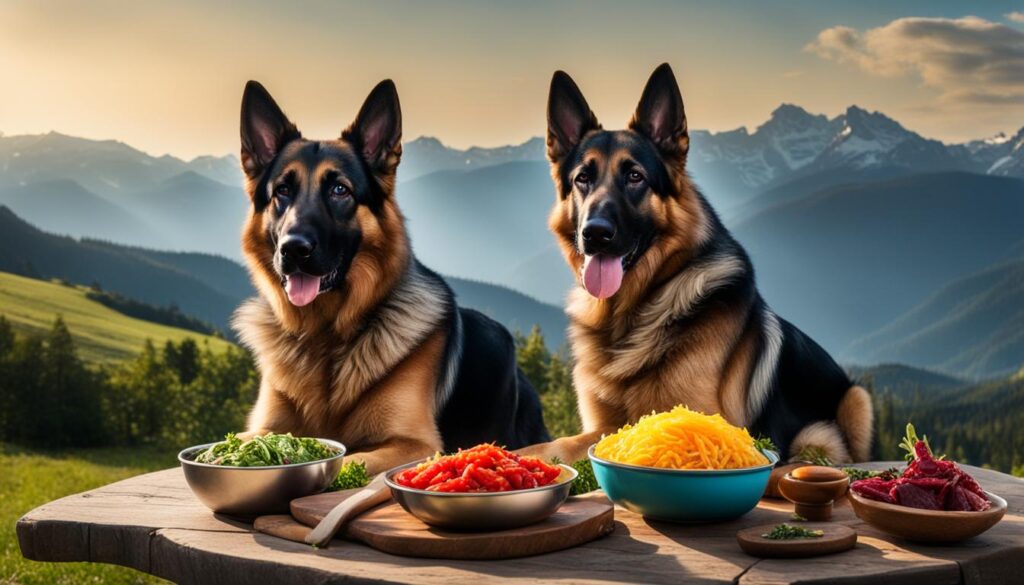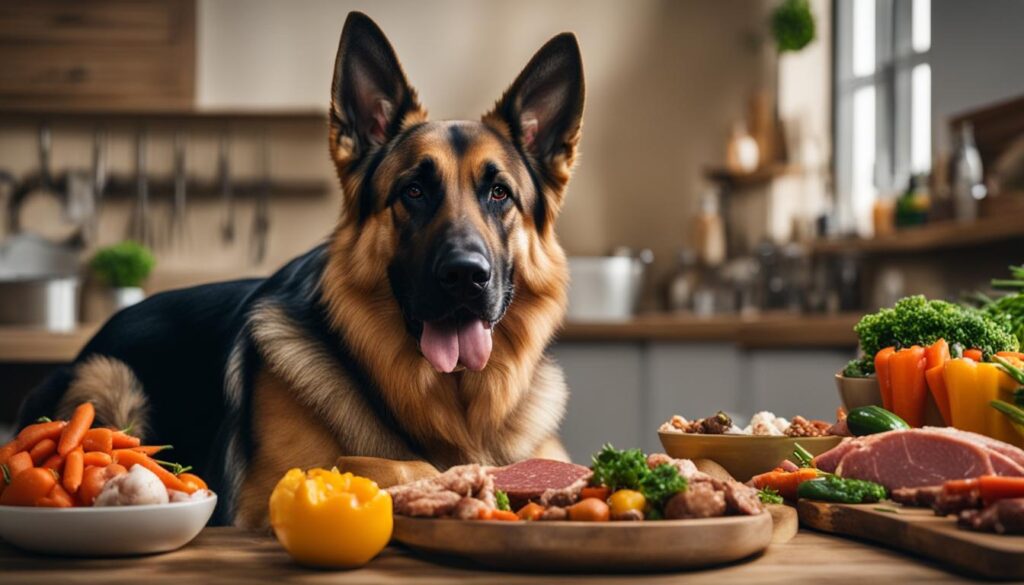If you are a proud owner of a German Shepherd, you know how important it is to provide them with a healthy and balanced diet. But with so many options available, it can be challenging to determine what to feed your furry friend.
In this section, we will explore the essential nutrition requirements for German Shepherds. We will discuss the best foods and a healthy diet plan for this active breed, helping you understand what to feed your German Shepherd for optimal health.
Key Takeaways:
- Understanding the nutritional requirements of German Shepherds is essential for providing them with a healthy diet.
- Your German Shepherd’s diet should include high-quality protein, carbohydrates, and healthy fats.
- Commercial dog food, homemade meals, and raw food diets are all viable options for feeding your German Shepherd.
- Creating a balanced and healthy diet plan, including portion sizes, feeding schedules, and supplements, is crucial for their overall well-being.
- By following the guidelines provided, you can ensure that your German Shepherd maintains a healthy and happy lifestyle.
The Best Food for German Shepherds
German Shepherds are active dogs that require a high-quality diet to maintain their health and energy levels. When it comes to feeding your German Shepherd, it’s important to choose the best food that meets their nutritional needs.
The first option is commercial dog food, which is convenient and has been formulated to provide a balanced diet for dogs. Look for dog food brands that use high-quality ingredients such as lean meats, whole grains, and vegetables, and avoid those with fillers, artificial preservatives, and colors. Additionally, you can opt for a specific formula designed for German Shepherds. These types of dog food have been created with the German Shepherd’s unique nutritional needs in mind.
Alternatively, you can create homemade meals for your German Shepherd. This allows you to control the ingredients and adjust the diet depending on their needs. You can include lean proteins such as chicken or beef, healthy fats like fish oils or yogurt, and complex carbohydrates like sweet potatoes or brown rice. A homemade diet requires time and effort, but it can be a cost-effective and healthy way to feed your German Shepherd.
Finally, you can choose a raw food diet, which consists of uncooked meats, bones, and vegetables. While there are some benefits to raw food diets, they can be expensive and can pose a risk of bacterial contamination. It’s essential to do your research and speak with a veterinarian before implementing this kind of diet for your German Shepherd.
In any case, always remember to provide your pet with fresh water, follow a feeding schedule, and monitor their weight and overall health. The right diet will ensure your German Shepherd stays healthy and energetic throughout their lives.
Tip: If you are struggling to decide what food is best for your German Shepherd, consult with your veterinarian. They can provide you with specific recommendations based on your dog’s unique nutritional needs.


A Healthy Diet for German Shepherds
Feeding your German Shepherd a healthy and balanced diet is essential to their overall health and well-being. A healthy diet for a German Shepherd should consist of high-quality proteins, healthy fats, and essential vitamins and minerals. In this section, we will discuss a feeding guide for German Shepherds, including portion sizes and feeding schedules. We’ll also cover important considerations for their different life stages, from puppyhood to senior years.
German Shepherd Puppy Diet
German Shepherd puppies require specific nutrients to help them grow and develop into healthy adult dogs. A puppy diet should contain higher levels of protein and fat to support their growth. You should also look for a food that contains DHA, which is crucial for their brain and vision development.
When feeding your German Shepherd puppy, it’s important to feed them several small meals throughout the day, rather than one or two large meals, to prevent digestive issues. You should also avoid overfeeding your puppy, as this can lead to excess weight gain and other health problems.
Feeding German Shepherds
When feeding your adult German Shepherd, it’s important to choose a high-quality dog food that meets their nutritional needs. Look for a brand that contains real meat as the first ingredient, rather than fillers like wheat or corn. A healthy diet for a German Shepherd should include around 18-22% protein, 5-8% fat, and 2-5% fiber.
It’s also important to feed your German Shepherd at the same time each day and to measure their food to prevent overfeeding. Portion sizes will vary depending on your dog’s age, weight, and activity level.
German Shepherd Feeding Guide


| Age | Number of Meals per Day | Portion Size per Meal |
|---|---|---|
| Puppy (8-12 weeks) | 4 | 1/2 – 1 cup |
| Puppy (12-16 weeks) | 3 | 3/4 – 1 1/2 cups |
| Puppy (16-24 weeks) | 3 | 1 1/4 – 2 cups |
| Adult (2-5 years) | 2 | 2 – 4 cups |
| Senior (5+ years) | 2 | 1 1/2 – 3 cups |
Remember, this is a general feeding guide, and your dog’s individual needs may vary. Always monitor your dog’s weight and adjust their food intake accordingly.
In addition to a high-quality dog food, you may also want to consider adding supplements like fish oil or joint supplements to your German Shepherd’s diet to support their overall health.
Conclusion
Now that you have a better understanding of what to feed your German Shepherd, you can ensure they maintain optimal health and vitality. Remember, a healthy diet is crucial for your dog’s overall well-being, and it’s up to you to provide them with the right nutrients and supplements.
By following the guidelines we’ve provided in this article, you can create a healthy and balanced diet plan that meets your German Shepherd’s specific dietary needs. Make sure to always use high-quality ingredients and to provide them with appropriate portion sizes and feeding schedules.
Lastly, don’t forget that each German Shepherd is unique, and their nutritional needs may vary. Be sure to consult with your veterinarian if you have any questions or concerns about your dog’s diet.
With the right diet and care, your German Shepherd can live a long, healthy, and happy life by your side.
FAQ
What should I feed my German Shepherd?
German Shepherds should be fed a balanced diet consisting of high-quality dog food that meets their specific nutritional needs. It is important to choose a food formulated for large breeds or German Shepherds to ensure they receive the right balance of proteins, carbohydrates, fats, vitamins, and minerals.
Can I feed my German Shepherd homemade meals?
Yes, you can feed your German Shepherd homemade meals, but it’s important to do it correctly. Homemade meals should be balanced and include lean proteins like chicken or beef, healthy grains such as brown rice or quinoa, and a variety of vegetables. Consult with a veterinary nutritionist to ensure your homemade meals meet your German Shepherd’s specific nutritional requirements.
Should I feed my German Shepherd a raw food diet?
Raw food diets have gained popularity, but it’s important to be cautious. Raw food diets may carry the risk of bacterial contamination and an imbalance of nutrients if not properly formulated. Always consult with your veterinarian before switching your German Shepherd to a raw food diet and ensure you follow the appropriate guidelines and safety precautions.
How often should I feed my German Shepherd?
It is typically recommended to feed adult German Shepherds twice a day, dividing their daily food portion into two meals. Puppies, on the other hand, may require more frequent feedings, usually three to four meals a day to support their rapid growth and development.
What are some important nutrients for German Shepherds?
German Shepherds require a diet rich in high-quality protein, healthy fats, and carbohydrates for energy. They also need essential vitamins and minerals such as calcium, phosphorus, and omega-3 fatty acids for healthy bones, joints, and overall well-being. Consult with your veterinarian to ensure your German Shepherd’s diet meets all their nutritional needs.
Can I give my German Shepherd treats?
Yes, you can give your German Shepherd treats as long as they are healthy and given in moderation. Look for treats specifically designed for dogs, preferably low in calories, and avoid treats that contain artificial additives or excessive amounts of salt and sugar. Treats should only make up a small percentage of your dog’s daily caloric intake.
How do I transition my German Shepherd to a new diet?
To transition your German Shepherd to a new diet, it is best to do it gradually over a period of about a week. Start by mixing a small amount of the new food with their current food, gradually increasing the proportion of new food each day. This gradual transition helps prevent stomach upset and allows your German Shepherd’s digestive system to adjust to the new diet.
Are there any foods I should avoid feeding my German Shepherd?
Yes, there are certain foods that can be toxic to dogs and should be avoided. Some examples include chocolate, grapes, raisins, onions, garlic, and foods sweetened with xylitol. These can cause various health issues, ranging from digestive upset to organ damage. It’s important to educate yourself about foods that are safe and unsafe for dogs.
How can I ensure my German Shepherd is getting a balanced diet?
To ensure your German Shepherd is getting a balanced diet, it’s important to choose a high-quality dog food that is specifically formulated for their breed or size. Read the nutritional information on the packaging and consult with your veterinarian to make sure it meets the necessary requirements. Regular check-ups and blood work can also help monitor your dog’s overall health and nutritional needs.

